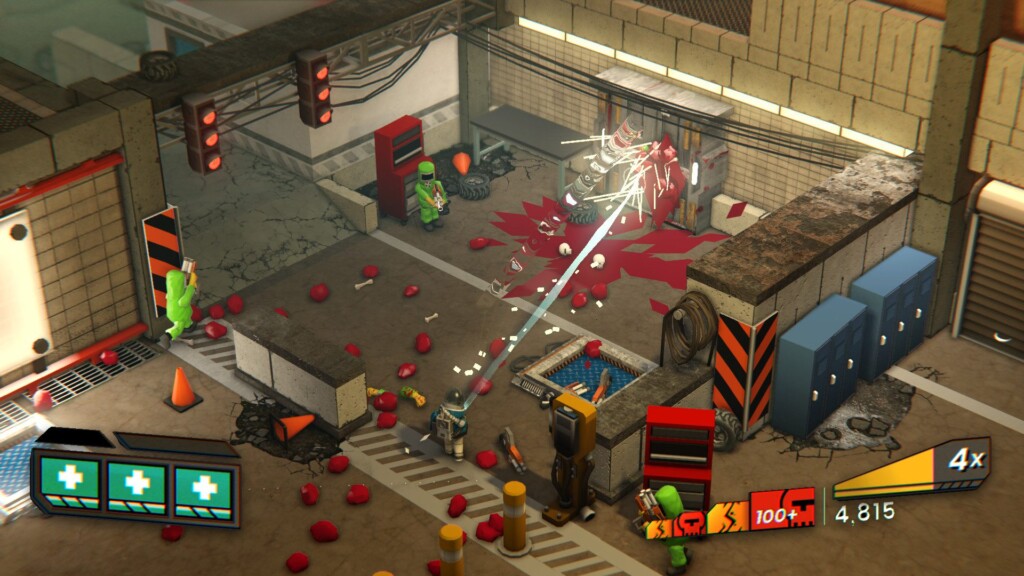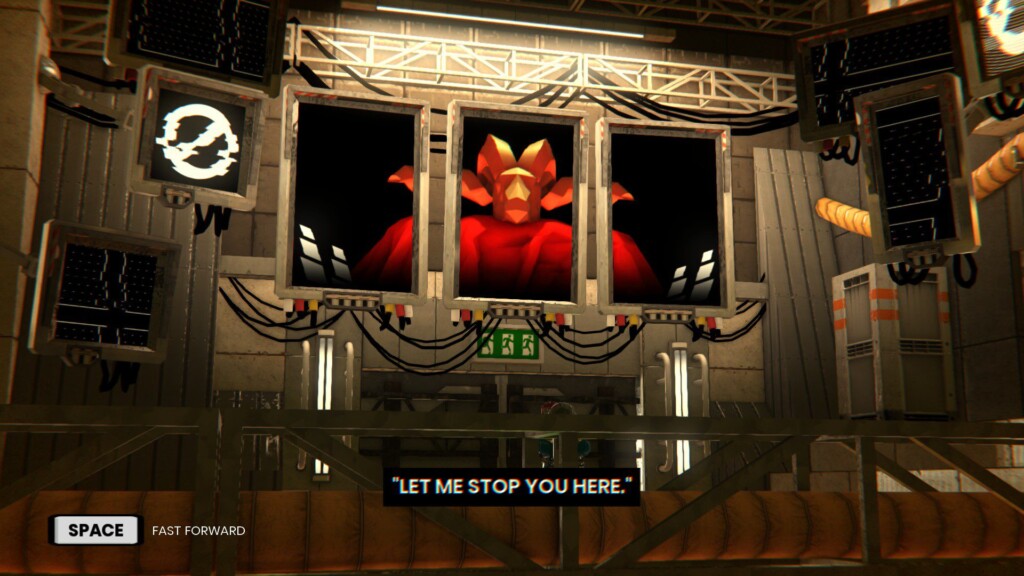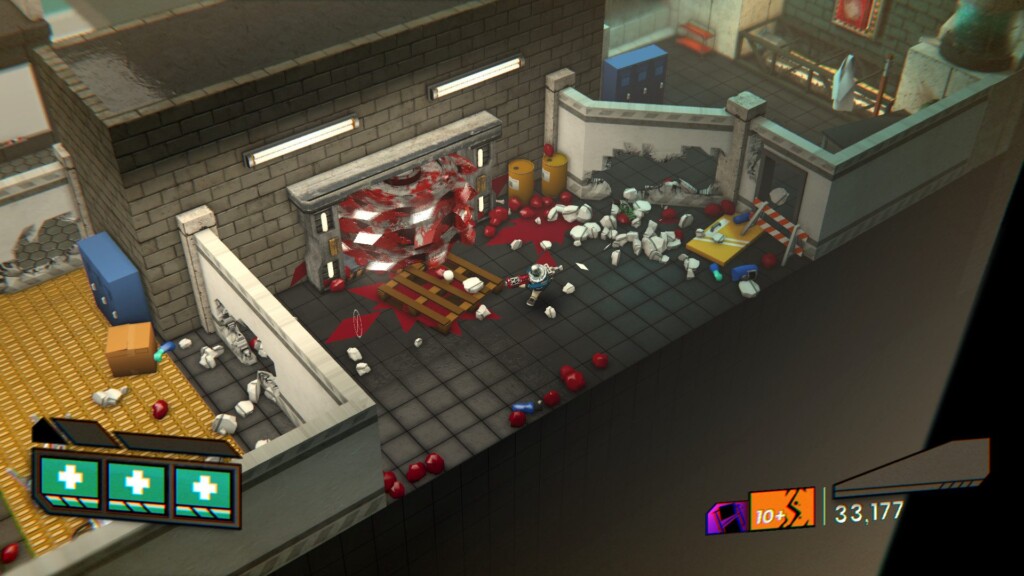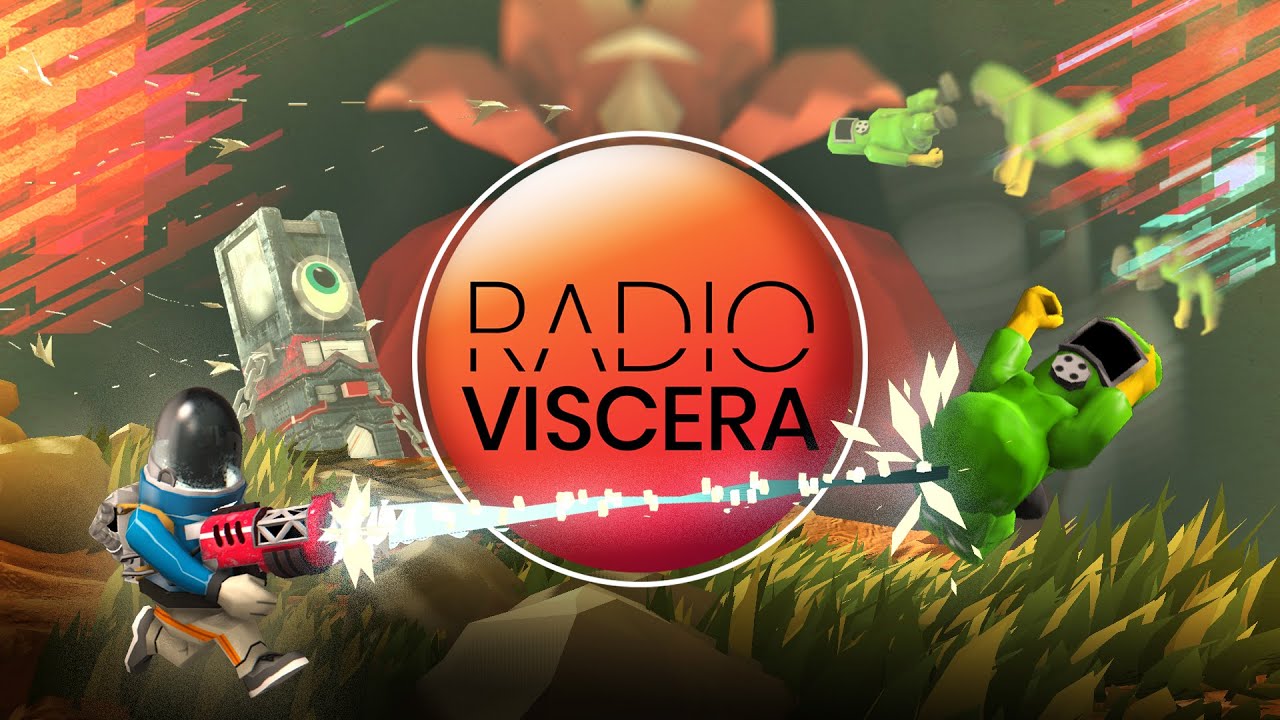Radio Viscera bills itself as a fast-paced top down shooter without bullets. That might seem strange (it sort of is) but the game manages to make it work and messes with the traditional twin-stick shooter format. The game will see you hurling enemies into all manner of environmental traps as you progress through a very weird near-future world. It’s a neat concept that really works well right off the bat and makes for some really exciting engagements, but it’s one that wears away fairly quickly thanks to checkpoints spreading farther and farther apart and a control system that isn’t as tight as it needs to be.
What makes the game special is the world that it creates for the player. Most of these twin-stick shooters are pretty short on story, but that is something that lately has been changing for the better. It’s a great way to keep a player invested, especially when your gameplay loop get pretty repetitive because of its limited scope. You take the role of a random dude in a spacesuit who lives in satanic Y2K cultist compound as is tasked with killing himself for some failure. You instead choose to fight and from there work your way through level after level killing cultists who are armed to the teeth.

For your part, you only have access to a makeshift weapon that seems to use concentrated blasts of air to push enemies away at fantastic velocities. This cool little gun can also blast through concrete walls, which open up other areas on the stages that you find yourself in. The main point of the game is to blast enemies into the various traps that are strewn about the various area. Maybe you have rotating blades that you can push enemies into and see the sliced to bits, or perhaps you push them into tanks of acid and see them pop like balloons, or even push them into closing doors, seeing them smashed to bits. It’s a neat concept and seeing these little dudes die in comically horrific ways is always delight. The problem is in the mechanics of your gun.
A game of this nature is made or broken in its controls, and Radio Viscera just doesn’t quite cut the mustard in that regard. In the early game this isn’t an issue, or even really noticeable, but when enemies start pilling up in waves things fall apart. Being a twin-stick-styled shooter I came into the game with a controller plugged in for maximum efficiency. The problem is that I could barely get past enemies after the second or so stage. Come to find out that using a controller is nearly impossible as your accuracy is completely hindered, dare I even say, broken. You don’t aim where you point you are pointing and there also seems to be a delay between moving my weapon and it registering on-screen. This is made even worse as the stages are tiered and the height makes finding a target difficult, even more so when you are fighting the controls.

Thankfully, keyboard and mouse controls are leagues better. It almost feels like playing an entirely different game. Mouse aiming is great and keyboard movement is spot on. But even then there is still a problem with targeting. You see, your mouse gets an indicator to show where you have it on-screen, but it’s a tiny white dot which means its incredibly easy to lose when a lot of action is happening. More often than not I felt as if I was shooting blind, losing the mouse in the action. And because of the tiered nature of the stages, it’s really easy for the mouse pointer to get confused on what you are trying to target leading to shooting walls and objects. This is bad as you have a limited number of shots before you can recharge is you shoot to fast. This left me needlessly vulnerable far too many times to count. On a smaller scale all of this isn’t a huge problem which is why the first chunk of the game is a real blast to play. But it’s when you start ramping things up where the flawed controls really come back to bite you in the ass.
And those tiered stages make taking out enemies a really pain at times because you simply don’t know where you are shooting. Objects that you didn’t see or notice will block shots and the camera is a real pain in general. It can jump around and make make seeing things nearly impossible. I often spent far too much time shoot a breakable wall to pass through but couldn’t because I couldn’t see the wall thanks to the camera and was shooting wildly at it. The isometric nature also hurts movement as you are never moving in the cardinal directions, always at a slight angle. This makes running into harzards really easy and makes the platforming a nightmare.

Radio Viscera is the sort of game that caters to speed-running, but it isn’t all that fun to run when the game itself is fighting you at every turn. You’ll definitely be blown away like I was the first couple of levels because the game radiates style. The world is fantastic, the story of wacky, and the gameplay concept is solid. It’s just when the game asks more of you that it falls apart, like entering a stack Mitsubishi Mirage in the Daytona 500. Sure, it’s a fun little car to take to and from work, but push it any harder and you are going to have a bad time.
And while Radio Viscera isn’t a clunker by any stretch, it’s clunky controls keep it from shining as brightly as it should. Hopefully a few solid patches can come around to help fix the control issues that are holding this one back from being something special. I wanted to love Radio Viscera for its world, style, chill collection mechanics, and its twin-stick nature, and maybe someday I’ll be able to, but for now I recommend to wait it out and grab it when it goes on sale.
Pros:
+ Fun Story
+ Great Gameplay Concept
+ Fun Visuals
Cons:
– Clunky Controls
– Design Hinders Action
– Repetitive Gameplay Loop
– Difficulty Wall Hits Fast
Final Score:
*a review code was provided by the publisher*

